Why Did Nelson Adulphus and Jennie Jesmer, My G-Grandparents, Move To Canada?
Why Did Nelson Adulphus and Jennie Jesmer, My G-Grandparents, Move To Canada?
By Kevin E. Jesmer 11-19-15
Nelson Adulphus Jesmer and Genevieve “Jenny” Soquet Jesmer
In 1899, the forty two year old Nelson did what he had done in the past, after five years in Hibbing he decided to pack his bags to go on ahead of his wife, Jennie, and four children, (Herbert, Ida, Carl and Harvey), to another pioneering community, Langdon North Dakota. By January 1899 Nelson was in North Dakota. By 1901 he was a shop owner in Southern Manitoba, living under the name Frank Jesmer for at least 16 years.
One has to ask themselves, why would Nelson leave Hibbing so quickly, without his wife and four small kids? Why would he leave a region where there were so many opportunities to make a difference in pioneering towns with ample business and political opportunities? Why leave the area where there are family connections as well as political and business connections? Why did he move to a new country, where there was no family and connections and even change his name? He was just recently making real-estate purchases in Duluth and enlarging his home and running for local political offices. He was raising a family with four young kids. Why move all the way to Manitoba and change his name? I believe it was because he was running from a prison sentence for grand larceny (second degree) and wanted to start a whole new life in Canada. This conclusion was made after two decades of research into my family history.
I always wondered why my Great Grandfather, Nelson Adulphus Jesmer and his wife Jennie and four kids moved into Canada. There were more than enough opportunities in the USA with the great Western Expansion in full swing. I always thought that it was because Nelson was a pioneer at heart, always wanting to start small businesses in pioneering communities. I thought he felt that he could not make any headway in politics in Minnesota. I thought that he was attracted to free land in Saskatchewan and moved up there from Langdon North Dakota. But, in light of new discoveries, there may have been more dubious reasons why he moved. Let me present my case….

The excerpt from the 1901 Manitoba Census.
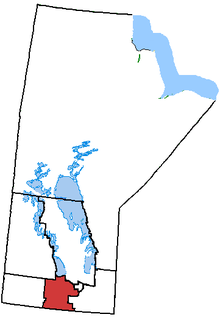
I discovered, from a genealogist in Winnipeg, (Denise Kerlin), that Nelson and his family were in a 1901 Manitoba census. His family lived in Ligar district, Argyle. They lived in Manitoba between 1899 and 1904, coming to Quill City Saskatchewan in 1904. Their neighbors In Manitoba were French, Gaelic, Chippewa and Cree (as derived from the full census sheet.) Nelson described himself as a store owner. He described himself and his wife Jennie and his son Herbert as speaking French and his three younger kids as speaking English. They were Catholic. Nelson sent his daughter Ida to study at Notre Dame D’ Lourdes, in 1906-1907.
But the interesting thing on the census is that Nelson declared his name as Frank. This name, Frank also appears in 1917, when Nelson’s son, Harvey Howard Jesmer, my grandfather, stated on his WWl draft paper, that his next of kin was his father named Frank. It was serious business, if they were willing to put the name, “Frank” on government documents for at least 16 years. I had never read that Nelson ever went by a nick name, “Frank”. And so why did he do it?
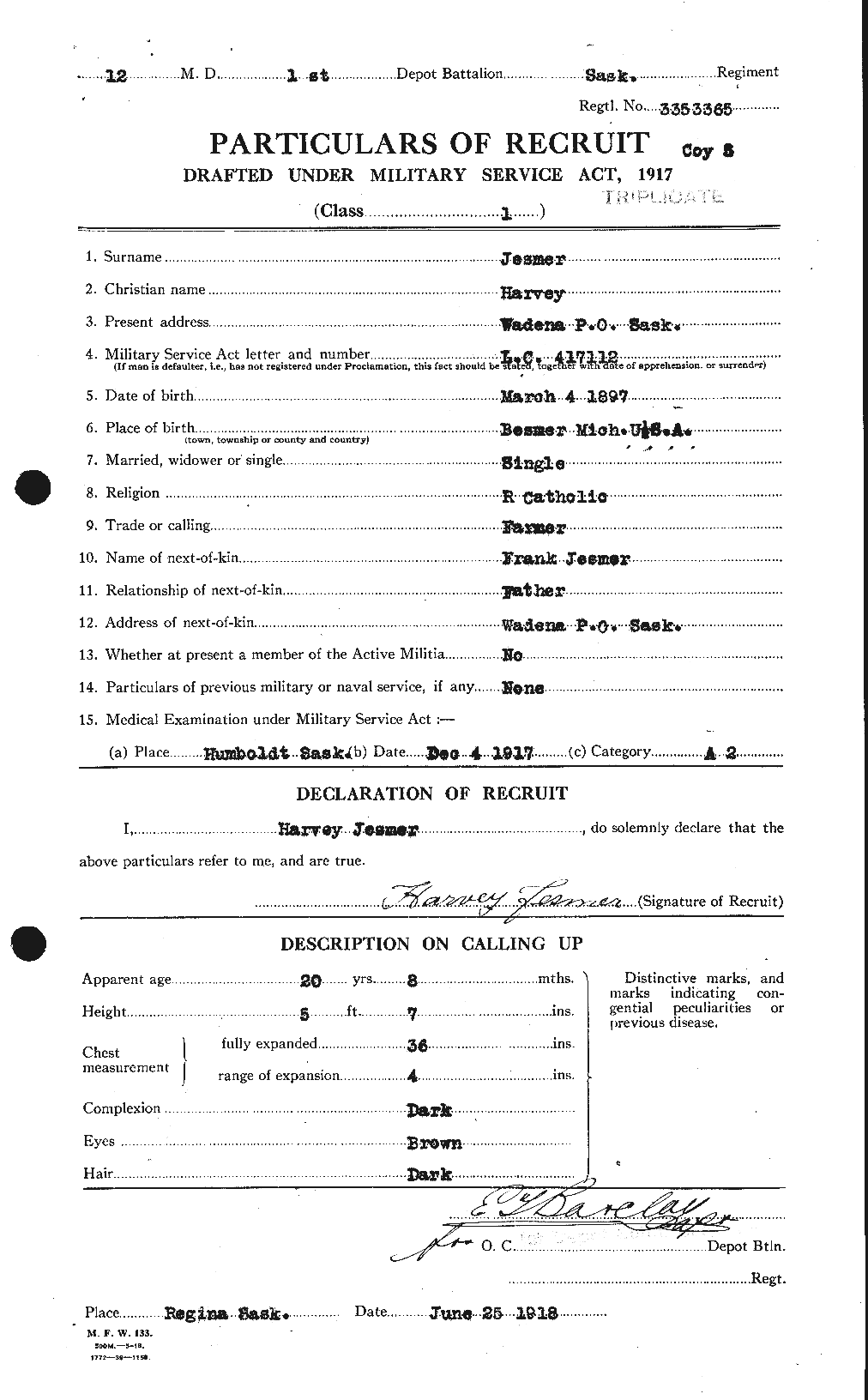
I think he did it because he was hiding his identity after being found guilty of Grand larceny to the second degree in Hibbing Minnesota, in 1898. This charge deals with embezzlement or tax evasion. Nowadays in New York, it could carry a six year prison sentence. Nelson and his siblings were involved in lots of business ventures. He was buying land in Duluth. (1897-98) His brother Joseph A. Jesmer ll, was dealing with timber in the same area. Nelson dabbled in local politics. He was one of the early pioneers, of Hibbing (1883) and was running for the office of post master (1895). He was making expansions on his home and operating a hotel named Colby House. (1883) I wouldn’t be surprised if he was involved in some business dealings that were not above the table. After pleading guilty to the charges of grand larceny in Hibbing, he went to the court in Duluth MN, where he was helped by his rich uncle, Nelson Edward Jesmer.
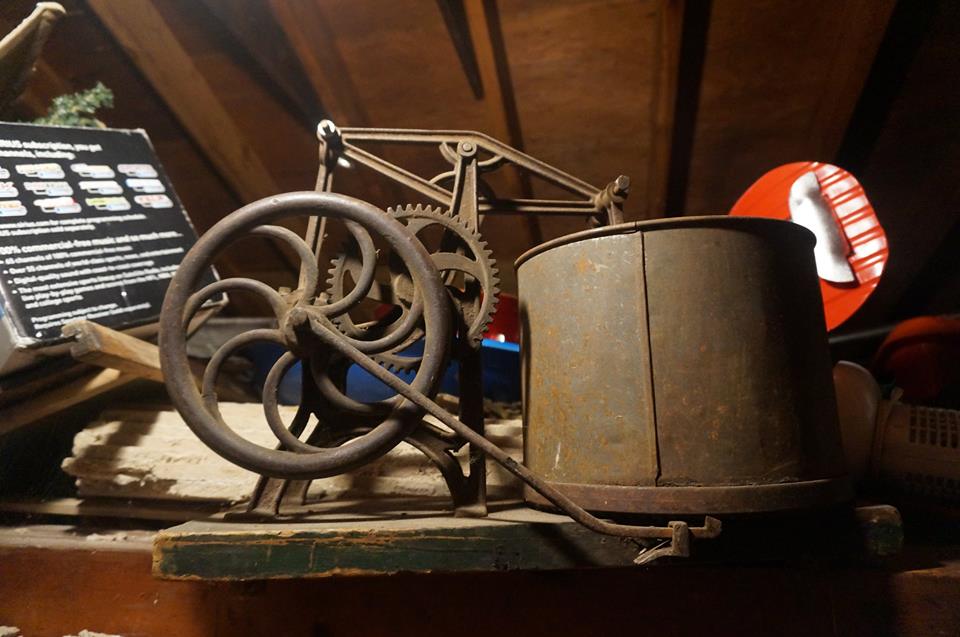
Nelson’s meat tenderizer from his hotel in Hibbing
I am not sure of the outcome of the deliberations in Duluth. All I know is that five months later, he left Hibbing to go to North Dakota without his wife and young children. They followed the next spring. It would be nice to think that he was going to North Dakota to set up shop and later send for his family. But my guess is that the court set the date for him to turn himself in to serve his sentence and before that date came, he left, adopted the name, Frank and moved to southern Manitoba, where he waited for his family. Later he ran a store and bought horses from the Native people and sold them to the Belgians in Southern Manitoba (according to family lore.)
Nelson’s name was getting sullied in Hibbing MN. Prior to pleading guilty to grand larceny in 1898, the father of Nelson’s new wife, Jennie, had escaped from a Wisconsin prison where he was serving a life sentence for murder of his wife, Esperance Hanon Soquet. He was suspected of four murders in total. He was at large with $500 bounty on his head, never to be caught. Nelson was accused of skirting prohibition laws by running a blind pig, in a hotel, in Hibbing Mn in 1895, a charge that he denied. Later he received an apology in the local paper. There was a whole lot of “dirt” surrounding Nelson, hindering his advancement in local politics and his mercy in the court system in 1898.
In Feb 1899, Jennie and the kids took the train from Hibbing Minnesota to Langdon North Dakota. Apparently they crossed the Pembina Valley into Southern Manitoba to live with Nelson, who was going by the name, Frank. Based in this, I would state that Nelson could have moved Northwest, to Manitoba, Canada, in order to avoid being jailed for grand larceny (second degree) and had changed his name to Frank in order to avoid extradition to the USA.
Nelson remained in Canada. He traveled to Winnipeg and Montreal on business trips and attending political conferences. But I never find him in the USA. His wife, Jennie visited Greenbay WI, several times to see her family. But Nelson is never seen with her in pictures. Nelson was not at his father’s funeral in 1901. (Mind you he was very far away.)
The question was posed that Nelson may have been simply attracted by free land in Canada. I agree that he grabbed the opportunity for free land in Quill City Saskatchewan in 1904. (Near present day Wadena.) But I think that this move was not the primary reason for moving to Canada. Once he was in Canada, he sought after the free land.
This is how the whole free land offer worked. There were millions of acres of free land to applied for. If one built a home on it and made other improvements, then they could keep it. The Dominion Lands Act required that each homesteader provide proof that the land had increased in value through additions (cultivation, building construction, etc.) costing labor and/or capital. The Dominion Lands Act stipulated the improvements that had to be made to a land grant before a homesteader would receive a Letters Patent from the Crown.
When a homesteader filed an application, the local Dominion Lands Office screened and validated the claim, and sent an inspector to the property to confirm that the improvements had been made. If the Board approved the application, it was forwarded to Ottawa for the “preparation and issuance of patents” by the Lands Patent Branch. (info provided by genealogist Denise Kerlin in Winnipeg 2015.)
I agree that the free land was a great draw for anyone, even Nelson A. Jesmer. But Nelson was not involved in farming since he left the family farm near Princeton MN. , in Greenbush Township. He had always been interested in running hotels and stores in pioneering communities. He was interested in local “politicking”. In 1897-1898 he was buying up parcels of land in Duluth MN. He might have bought 150 acres. My guess he was doing land speculating for future iron mining for that is what was happening 60 miles away in Hibbing MN. Nelson was always had successful businesses. The Midwest USA was full of opportunities. Town after town was being founded. There were timber and mining ventures. (Maybe the land purchases were the reason for Nelson pleading guilty to grand larceny 2nd degree. ) Nelson A. Jesmer didn’t need free land in Canada to make a go of it in the Midwest USA. And even if the motive of his move was to get free farmland in Canada, why change his name when he moved into Manitoba and carry on the rouse for at least 16 years? He was never known by “Frank” before crossing into Canada. The acquisition of free land was a secondary thing.
Part 2: Newspaper Articles And Events to Support My Hypothesis
The following are some newspaper articles and some commentaries on the times and places that Nelson lived. They are included to give the reader some insight on what led up to Nelson and Jennie Jesmer’s quick move out west to North Dakota….
1885 A boom was on in the city and people began to filter into Bessemer in increasing numbers. Mining was the major industry and as more mines were developed, nearly every home boarded men. Some homes had as many as 21 men at a time and a hired girl helped cook, clean, wash the miners clothes, and make their lunch pails. The miner was paid from $1.05 to $2.00 per day, the hired girl was paid $8.00 per month.
Life In Bessemer MI • Among the earliest settlers were P.H. Dolan, boarding house; Jeffres & Mickleson, hardware and general store; Ehrmanntraut Bros., meat market; Jesmer & Long, Colby House; and Frank Hiffing, L. E. E. Pope, and C. D. Fournier.
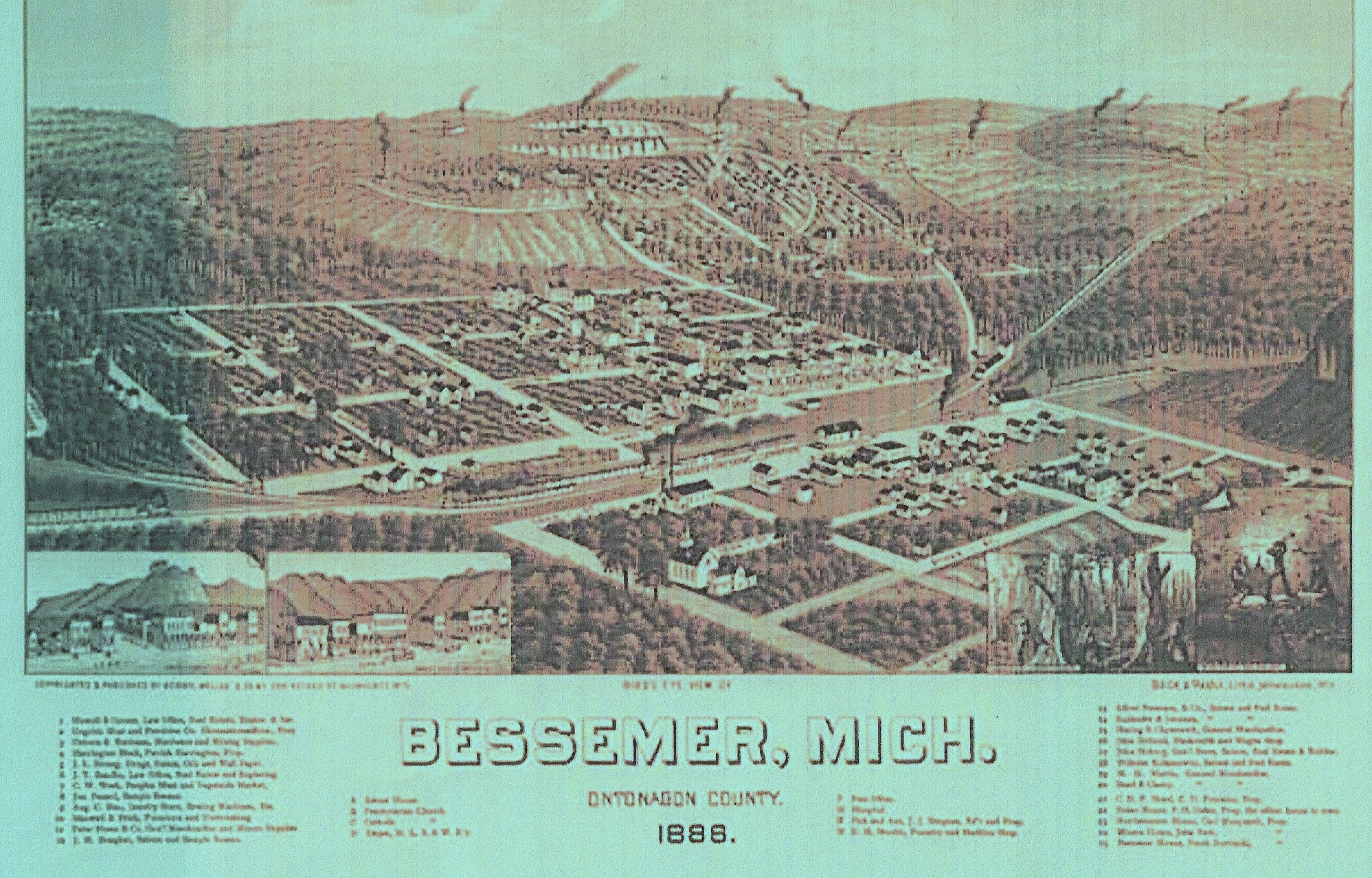
2/16/1887 Father of his future wife, (Jenny Soquet) arrested in Greenbay WI, for 1st degree murder of his wife Jenny’s mother. Jenny Soquet is 29 years old.
The Tale Of A Portrait Julia Francart Englebert Her Untold Untold Story” by John Henry Mertens 1990.
4/18/1887 J.P. Soquet pleaded not guilty to the charges of murder.
7/12/1887 J.P Soquet was found guilty, by jury, of murder in the first degree.
7/16/1887 J.P Soquet sentenced to hard labor, for life, at Waupun Wisconcin.
1887 (This was added to show the political corruption in the towns Nelson A. Jesmer lived. He was very active on the political scene, wherever he lived.)
During the heated election in 1887 on the location of the county seat, Bessemer voted four times its population, while Ironwood polled three times as many votes as its population. In March 1887, 360 voting members assembled and voted to organize the village of Bessemer. In the same year Gogebic County was officially created by the Michigan Legislature. Also in the year Bessemer and Ironwood called an election to see which city would be the county seat and also have the Court House. Ironwood secured the support of the railroad workers and people in Watersmeet. When Bessemer pioneers Paul Rutiman, Sr. and Joe Pecard found out about this, they plotted to change Ironwood’s plan. Ironwood men traveling to Bessemer to vote were made drunk and the train did not stop at the voting site. Ironwood lost and Bessemer gained the county seat. This began a rivalry between the two cities that sill has not ended even today. The site selected to build the court house was the cemetery, as a result bodies were removed to the new cemetery Hillcrest. One far sighted individual suggested that the court house be built of stone rather that wood.
1888 Population of Bessemer was 5,876. New courthouse and jail were built in Bessemer out of Lake Superior brownstone. There were two newspapers, The Pick and Axe and The Spirit and two railways, The Milwaukee Lake Shore and Western and the Wisconsin Central.
1/1890 J.P Soquet returned to Brown County for a retrial.
3/29/1890 Nelson married to Genevieve “Jenny” Soquet in Bessemer MI.
1890 By 1890, Bessemer, built close to the Colby mine, had 48 saloons, 18 boarding houses, 15 hotels, 5 restaurants, 3 grocery stores, 3 photographers, 2 jewelers, 2 newspapers, 3 doctors, and 6 lawyers.
5/17/1890 Jenny Jesmer was in Greenbay WI, attending her father’s first degree murder trial of her father, Jean Philippe Soquet. Sentenced to life for killing his wife, and went to work on a prison farm.
9/27/1890 Jenny Jesmer’s father, escapes from a prison farm. Never to be captured or located.
It was said that Jenny’s father escaped from a prison work crew, dressed as a nun. He escaped and never was seen again. He went to Oregon, where his son, Jule Ego lived. He died in 1910 in Washington State under the alliance, John Rano. When he escaped from the Wisconsin prison, could he have come to visit his daughter Jennie Jesmer and son-in-law Nelson. After, it was documented that Jenny was crying at her father’s trial. Did she have a “soft spot” in her heart for her father? Did he receive assistance from them, secretly, before he left for Oregon state? Before Jennie got married, she was said to have been “testing the waters” of being a nun.
10/4/1890 Bounty of $500 set for the capture of Jennie’s father.
1893 Major financial collapse in Bessemer
Thirty six year old Nelson and his wife, son Herbert, daughter Ida, their new son, Carl, were faced with a dilemma. They had been establishing themselves in Bessemer as hotel owners. They had property in the down-town area. But what should they do now? There was an economic collapse. Nelson and his wife decided to make a new beginning in a new community, Hibbing, and start again to build their lives (following their previous pattern) There Nelson could make a name for himself. So after nine years in Bessemer, they decided to move to the iron mining town of Hibbing MN
Nelson named as one of the pioneers of Hibbing MN (the circled name)
From: Hibbing, The Man and The Village. 1968
12/22/1894 Appointed Postmaster of Hibbing
5/9/1894 Nelson, bought timber from “up north”
9/8/1894 Making improvements to his home
This is the first instance of Nelson joining local politics. (Just like his uncle Adulphus.) He is thirty eight years old and ran for the office of Post Master. He was able to endure opposition and slander and still enter the fight of the elected position. He was accused of operating a “blind pig.” This was how hotel owners would sell alcohol despite of prohibition laws. They would offer free alcohol but people would have to pay an entry fee to see some attraction, like a “blind pig”. People were actually paying for the alcohol. It was declared in the local papers that this was a lie. But I believe that it was not beyond Nelson to do such a thing.
January 9, 1895, “Hibbing’s Woes. “ After the School Board Comes The Trouble With the Postmaster. They are having a warm time at Hibbing over the recent appointment of the new postmaster. It seems that Murphy, the original Postmaster, was several months ago brought to a Duluth hospital and after recovering from the fever went on to visit his old home in Canada to regain his strength. Some enterprising individuals quietly got up a petition, signed mostly by men in the outlying timber camps, asking for appointment of N.A. Jesmer on the ground that Murphy had practically abandoned the office, leaving an offensive partisan Republican charge. The scheme worked and Jesmer got the appointment a few days ago.
That made the people mad, for less than two years ago Jesmer was sent to a county jail in Duluth to serve a 90-day sentence for running a blind pig. The storm center was soon transferred to Washington and Major Baldwin had the appointment hung up. A remonstrance against the issuance of Jesmer’s commission is now being circulated in Hibbing and receiving lots of signatures. (The Commonwealth. Duluth Mn.)
1/12/1895 Visited Bessemer MI. Slandered by opposition for the Post Master position.
January 12, 1895, “N. A. Jesmer has returned from a trip to Bessemer, Mich., his former place of residence. He was considerably astonished to learn that the bitter guerilla warfare that has been waged upon him by his post office opponent during his absence.”
1/19/1895 Nelson wrote letter to newspaper to counteract the charges. Newspaper apologizes.
January 19, 1895, “N.A. Jesmer called the Commonwealth’s attention to the fact that the charges made by that paper that he had served a term in jail for running a blind pig were false, and in reply the Commonwealth makes a “cheerful” apology. The paper didn’t say anything condemnatory of the vindictive maliciousness of its lying informant who instigated the charge. however. The slander did its work, just the same, of withholding Mr. Jesmer’s post office commission for a time.” The Hibbing Sentinel
“The Sentinel, regrets that the opposition to Mr. Jesmer’s appointment find it necessary to resort to down right lying, with a view to poisoning the minds of Washington officials against him, in their struggle for the retention of the Hibbing post-office. A sample of the dirty work employed was the publication a recent number of the Duluth Commonwealth of the charge that Jesmer was once sent to the county jail to serve a 90 day sentence for remaining a blind pig. It was a lie pure and simple and the author and the paper are likely to reap their just deserts for their libel.”
The Hibbing Sentinal
Definition of “Blind Pig” : Blind pig……From Wikipedia, the free encyclopedia
This page is about a class of drinking establishment. A blind pig, also known as a blind tiger or booze can, is an establishment that illegally provides alcoholic beverages. The name originated in the United States in the 1800s, when blue laws restricted the sale of alcoholic beverages. A saloon keeper would charge customers to see an attraction (such as an animal), and provide a “complimentary” alcoholic beverage, thus circumventing the law. It was during the years of prohibition that blind pigs were most common in the U.S. Estimates of the number of blind pigs in some major U.S. cities in the mid-1920s are: The blind pig is a classic example of black market economics, and with the end of prohibition in 1933 most blind pigs had to either become legitimate establishments or close shop. Common current examples of the blind pig include the after hours club and the keg party. In Canada, however, traditional blind pigs continue to flourish, although they are usually known as booze cans.”
4/27/1895 Opposition group rally’s around Murphy and publishes article of support.
11/30/1895 Nelson raising and enlarging his residence
March 18, 1897 (to 1898) Nelson bought 40 acres near Duluth Minnesota.
5/14/1898 N.A. Jesmer is indicted on 2nd degree grand larceny charges.
May 14, 1898, “Jesmer Plead Guilty. Nelson A. Jesmer and Joseph Lalone, who were arraigned in the district court on Tuesday on indictments charging them with grand larceny in the second degree, appeared in court and entered pleas of guilty and were remanded to jail. They will probably be sentenced today or Monday. Mrs. Jesmer left for Duluth this morning. It is rumored in town this morning that a politically influential and financially well-fixed brother who has extensive interests in Princeton, this state, is at Duluth and using every honorable means to save the family name from the odium of a penitentiary sentence on one of its members. Blood is thicker than water and when backed by political and financial influence, cuts considerable fee in any court, even in summer time.” The Hibbing Sentinel
January 7, 1899, “Mrs. N.A. Jesmer and children will soon leave Hibbing and join her husband in North Dakota.” The Hibbing Sentinel
February 11, 1899, “Mrs. N.A. Jesmer and children left Thursday to join her husband in Langdon, N.D.” The Hibbing Sentinel
The modern definition of Grand larceny
- the crime of theft of another’s property (including money) over a certain value (for example, $500), as distinguished from petty (or petit) larceny in which the value is below the grand larceny limit. Some states only recognize the crime of larceny, but draw the line between a felony (punishable by state prison time) and a misdemeanor (local jail and/or fine) based on the amount of the loot. (See: larceny, theft)
http://legal-dictionary.thefreedictionary.com/grand+larceny
Grand Larceny in the Second Degree: New York Penal Law 155.40, is the lower of the two most significant degrees of theft and larceny in New York. However, an experienced New York criminal lawyer or theft crimes attorney will certainly tell you that NY PL 155.40 may not be the highest or top Grand Larceny crime, but one that could easily land you in prison for a significant period of time.
Grand Larceny in the Second Degree is often associated with:
Embezzlement; Criminal Tax Fraud; Residential Mortgage Fraud; Healthcare Fraud; Scheme to Defraud
Irrespective of whether the theft occurred by one means or another, the threshold for NY PL 155.40 is whether or not you stole or took property valued greater than $50,000, but equal to or less than $1,000,000. ….
Punishable by up to five to fifteen years for a first time offender, this “C” felony has no mandatory minimum prison sentence.
Jan., 1899 Nelson was living in Langdon ND.
2/9/1899 Wife and children left Hibbing to go to Langdon ND.
Comment: The fact that Nelson was indicted on 2nd degree grand larceny charges, meant that his life in local politics was over in Hibbing. He could not continue with what had become a major passion in his life. He might have even been facing jail time, for he did plead guilty to grand larceny in the second degree. Though he went to Duluth, on 5/14/1898, where his rich Uncle, Nelson Edward Jesmer, from Princeton MN, came to help him out, there is no indication that he was set free. I think that he was sentenced and sent back to Hibbing to be with his family. Possibly he was to return to Duluth to serve jail time.
After So in order to make a new beginning, the forty two year old Nelson did what he had done in the past, after five years in Hibbing he decided to pack his bags to go on ahead of his wife, Jennie, and four children, (Herbert, Ida, Carl and Harvey), to another pioneering community, Langdon North Dakota. By January 1899 Nelson was in North Dakota. By 1901 he was a shop owner in Southern Manitoba, living under the name Frank Jesmer for at least 16 years.
One has to ask themselves, why would Nelson leave Hibbing so quickly, without his wife and four small kids? Why would he leave a region where there were so many opportunities to make a difference in pioneering towns with ample business opportunities? Why leave the area where there are family connections as well as political and business connections? Why did he move to a new country, where there are no connections and even change his name? He was just previous making real-estate purchases in Duluth and enlarging his home. I believe it was because he was possibly running from a prison sentence for grand larceny: second degree and wanted to start a whole new life in Canada.
1899-1904 Nelson Edward Jesmer “Ted” (Nelson’s grandson) stated, that one of his cousins said, that Nelson was buying horses from the Natives and selling them over the border in Canada. There were French Canadian communities 20 miles north, across the Pembina River valley, in Southern Manitoba. Ida Jesmer, Nelson’s daughter, also attended a Catholic School in Manitoba, Canada. The 1901 Manitoba census has Nelson, living under the name “Frank” and described his occupation as a store owner.
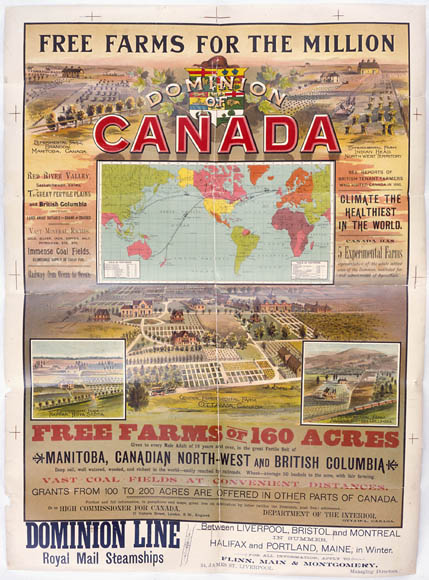
Spring 1904 Moved to Quill City area in Saskatchewan Canada. There was free land, a new community, more distance from Hibbing MN. Nelson continued using the name Frank, at least until 1917, for his son, Harvey referred to his next of kin, as Frank Jesmer, on his army registration paper. The following is an excerpt from a biography of Nelson and Jennie Jesmer on their move to Saskatchewan. Some corrections to article are that Nelson’s father, Joseph, didn’t own a chain of stores. It was Nelson’s rich uncle, Nelson Edward Jesmer who owned one store in Princeton MN. I am not sure that the siblings depended on their uncle. They seemed to be able to etch out a life for themselves. I don’t think that Jennie was ever an official nun. She may have been exploring the possibility. And if my hypothesis is true, Nelson was not disowned by his family. He purposely stayed out of the USA because of the grand larceny conviction.
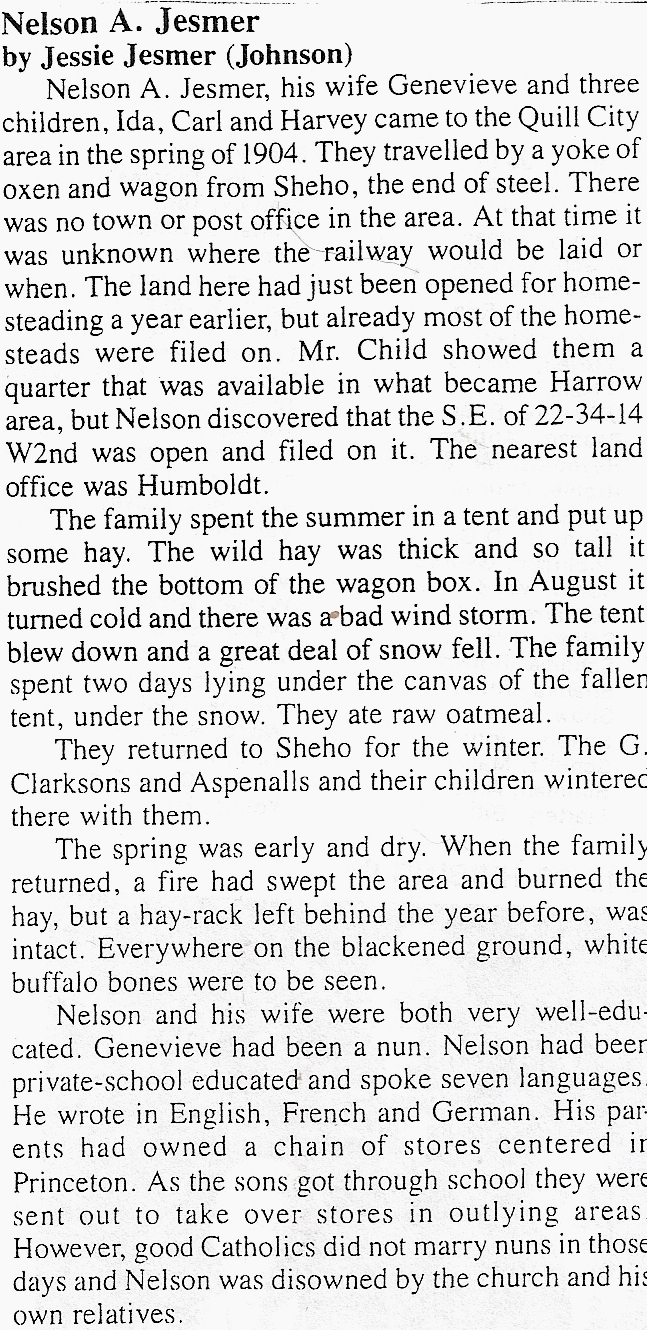




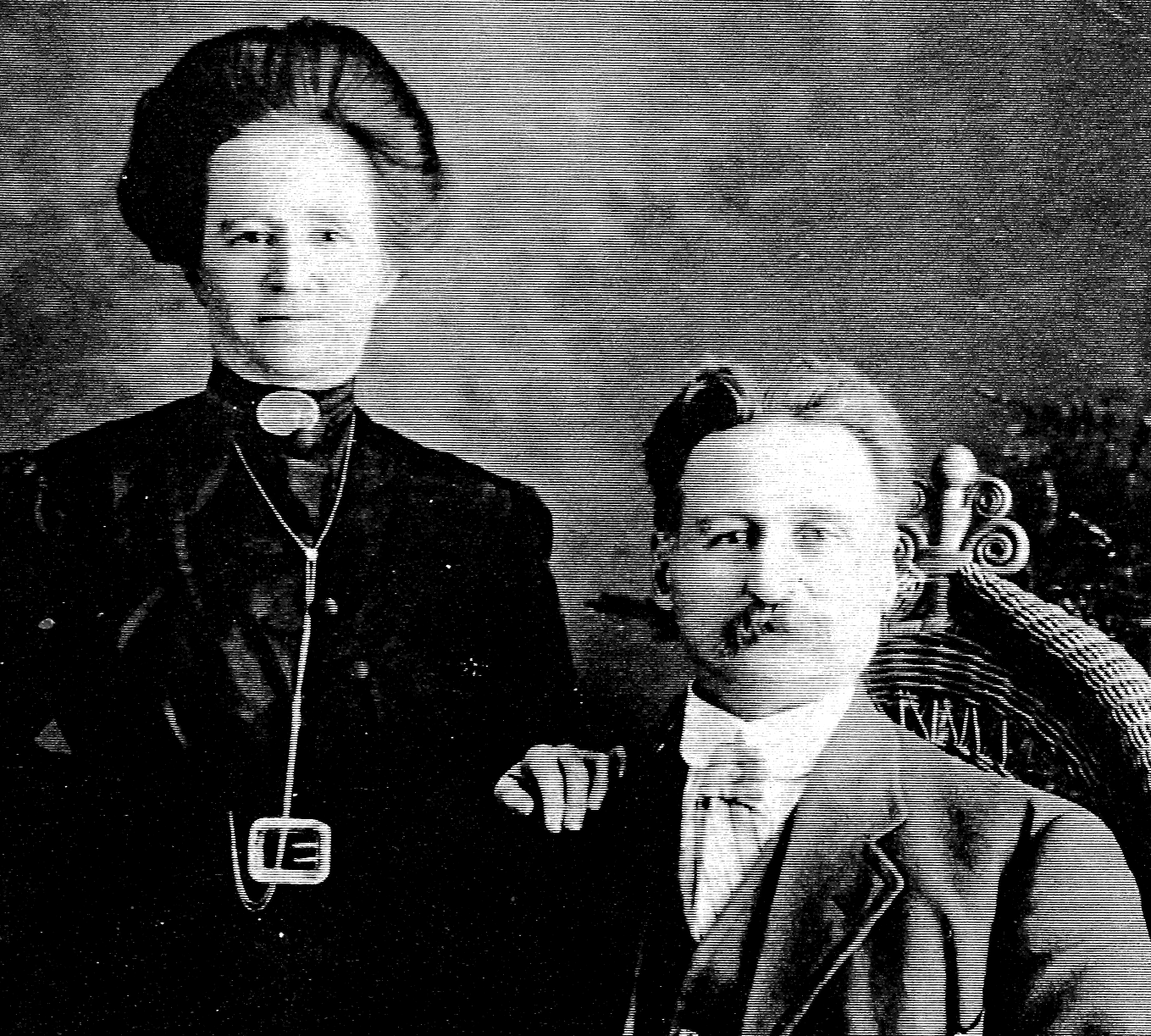
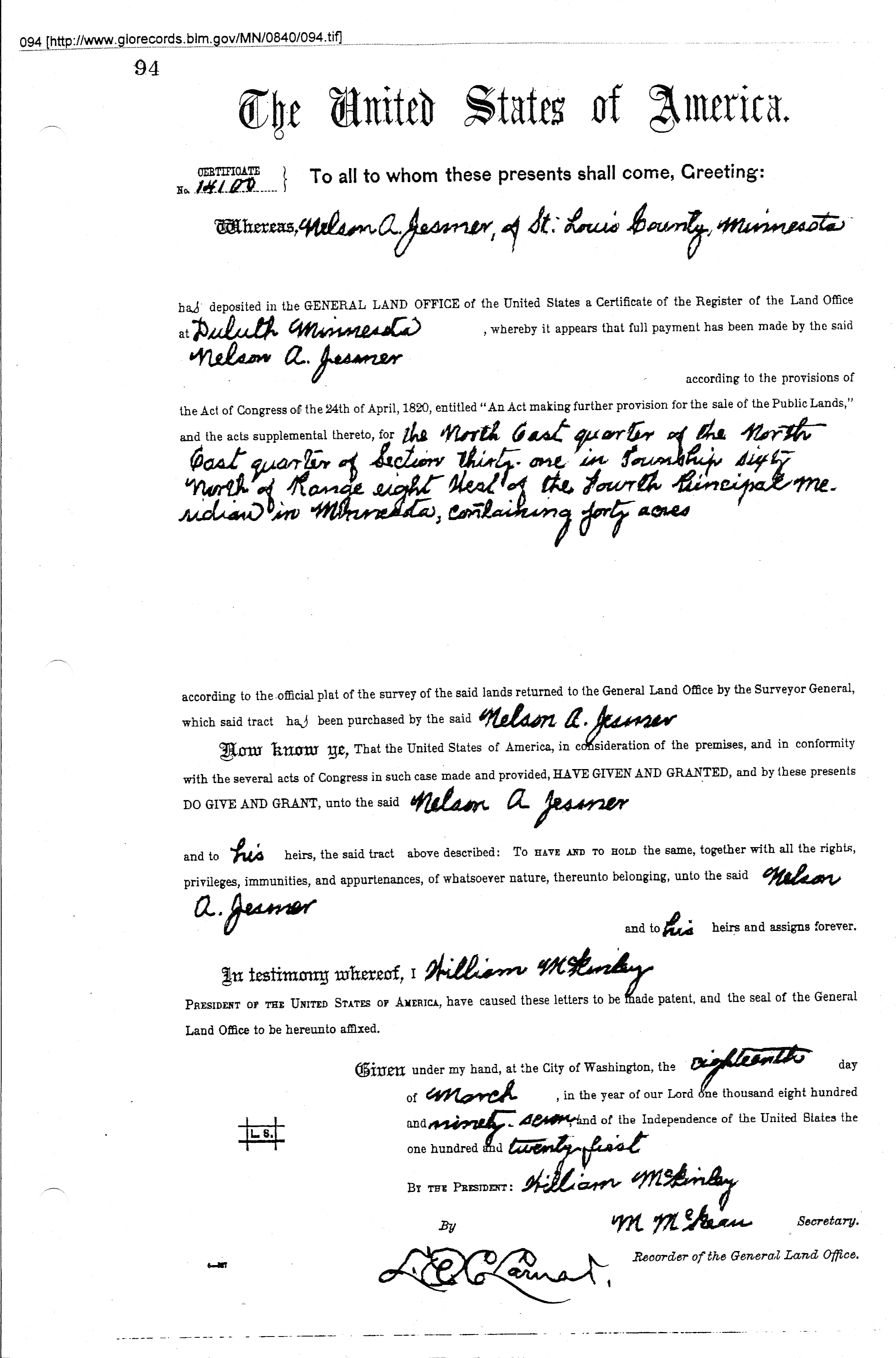
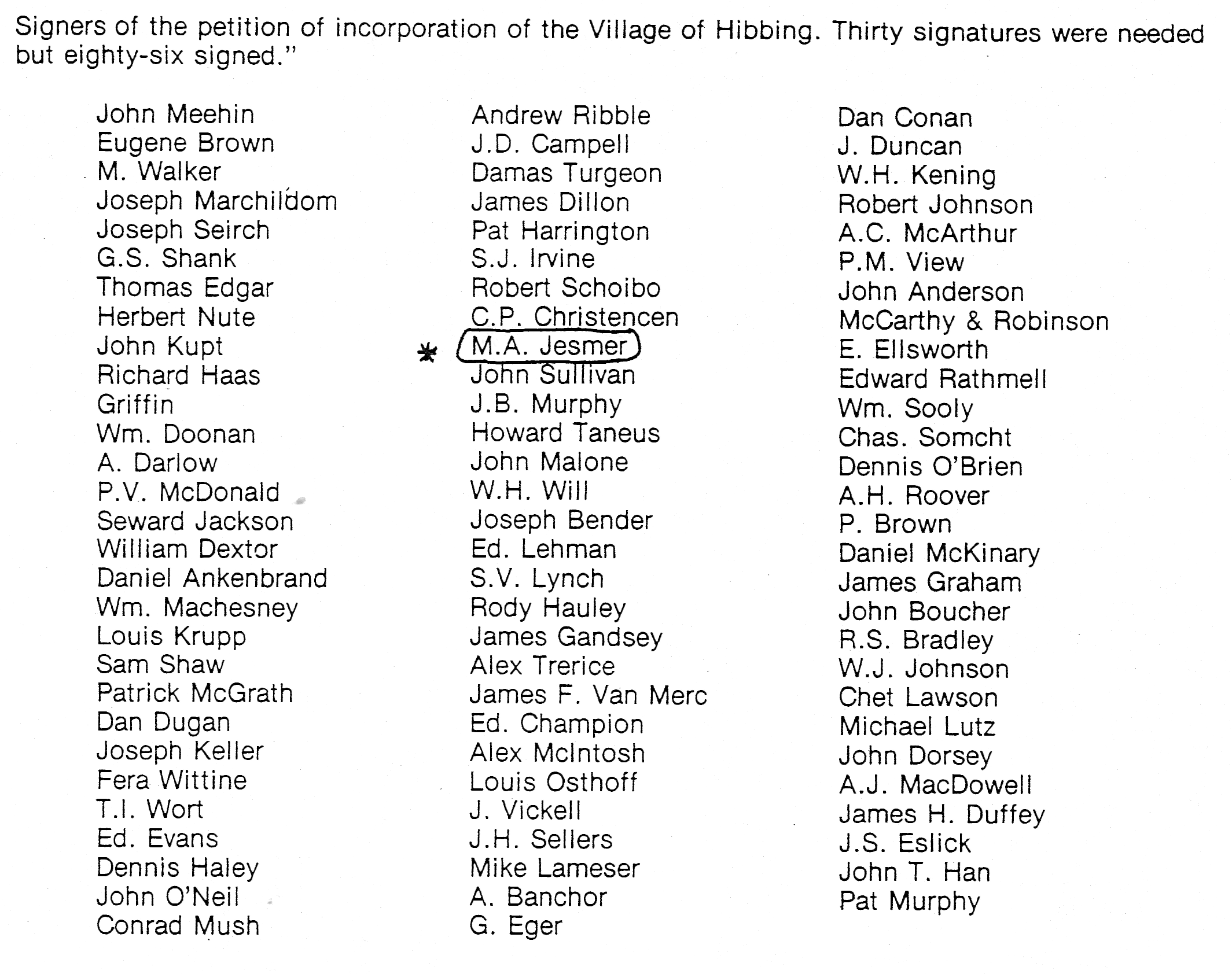


Interact with us using Facebook